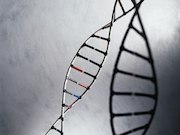Positive correlations of genetic variations with Empathy Quotient, risk for schizophrenia, anorexia
MONDAY, March 12, 2018 (HealthDay News) — Genetic variations associated with empathy play a role in psychiatric conditions and traits, including schizophrenia, anorexia nervosa, and extraversion, according to a study published online March 11 in Translational Psychiatry.
Varun Warrier, from the University of Cambridge in the United Kingdom, and colleagues conducted the largest genome-wide association study (GWAS) of empathy to date using the well-validated self-reported Empathy Quotient (EQ). Data were included for 46,861 research participants from 23andMe, Inc.
The researchers identified 11 suggestive loci (P < 1 × 10−6), although after correction for multiple testing, none were significant at P < 2.5 × 10−8. The most significant small nucleotide polymorphism (SNP), an intronic SNP in TMEM132C (rs4882760), was identified in the non-stratified analysis. A modest but significant narrow-sense heritability was found for the EQ. A significant female advantage on the EQ, predicted in earlier work, was confirmed. Between the sexes there was similar SNP heritability and high genetic correlation. There was also a significant negative genetic correlation between autism and EQ, as predicted. A significant positive genetic correlation was identified between the EQ and risk for schizophrenia, risk for anorexia nervosa, and extraversion.
“This is the first GWAS of self-reported empathy. The results suggest that the genetic variations associated with empathy also play a role in psychiatric conditions and psychological traits,” the authors write.
One author is an employee of 23andMe, Inc.
Copyright © 2018 HealthDay. All rights reserved.








